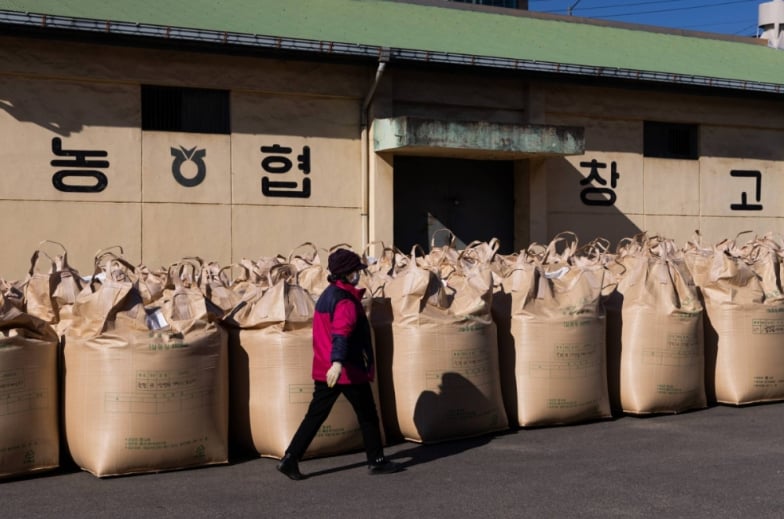November 24, 2025 | 18:06 GMT +7
November 24, 2025 | 18:06 GMT +7
Hotline: 0913.378.918
November 24, 2025 | 18:06 GMT +7
Hotline: 0913.378.918

Bags of rice at a warehouse in Pyeongtaek, South Korea. Japan imported South Korean rice for the first time since 1999 this month amid soaring domestic prices for the staple grain. | BLOOMBERG.
Japan imported South Korean rice for the first time since 1999 this month as soaring prices of domestic grain fueled demand for foreign products despite heavy tariffs, a South Korean industry official said Monday.
The imports were made via the Japan office of South Korea’s National Agricultural Cooperative Federation, better known as NongHyup, which said it brought in and sold 2 tons of Korean rice online and at local supermarkets this month.
While the amount accounts for a sliver of Japan’s consumption, it offers a bright spot for South Korea’s overall exports, which were slammed in April by U.S. President Donald Trump’s protectionist trade policies. It also comes at a time when Asian countries are seeking to improve trade ties with one another to overcome Trump’s efforts to upend global trade. Last month, the trade chiefs of South Korea, China and Japan met in Seoul and renewed their call for free trade.
Korean rice had not had a price advantage because of tariffs previously but it’s competitive now, an official at NongHyup’s Tokyo office said by phone, wishing to remain anonymous due to the sensitivity of the situation. The person added that it was the first such sale since NongHyup opened its Tokyo office.
The Nonghyup official said the initial shipments of 2 tons have already been sold out and 20 additional tons were scheduled to arrive by next week.
Japan levies around ¥340 ($2.40) per kilogram on rice imports that exceed a duty-free quota of about 770,000 metric tons a year, and Japanese consumers’ preferences for domestic grain and the country’s convoluted supply chain have also complicated imports.
But consumer rice price jumped 92% last month from a year earlier, the fastest pace of increases since 1971 and accelerating inflation, according to data from Japan’s internal affairs ministry.
japantimes

(VAN) Viet Nam is entering the pivotal period of 2025-2030, moving toward the formulation of the Remote Sensing Law, which will establish a legal foundation for the development of national digital data.

(VAN) The agricultural sector is finalizing the strategic framework for emission reduction, setting the goal of sharply cutting methane and 403.7 million tons of CO2 equivalent and moving toward Net Zero by 2050.
/2025/11/22/2236-1-153832_483.jpg)
(VAN) The National Marine Spatial Planning is opening up opportunities for sustainable blue sea development across 21 coastal localities.

(VAN) Viet Nam’s forestry sector is undergoing a comprehensive transformation, strengthening management, protection, and development efforts to maintain ecological security and drive green, sustainable growth.

(VAN) Viet Nam is accelerating efforts to digitize reservoir operations, from real-time data to hydraulic modelling.
/2025/11/21/3348-2-102623_454.jpg)
(VAN) National Assembly delegate Nguyen Thi Lan has proposed adding special mechanisms to attract human resources to the agricultural, forestry, and fishery sectors, addressing the shortage of high-quality personnel.

(VAN) Over the past two decades, the unified legal framework for water resource management has been perfected, becoming a crucial foundation for ensuring national water security.